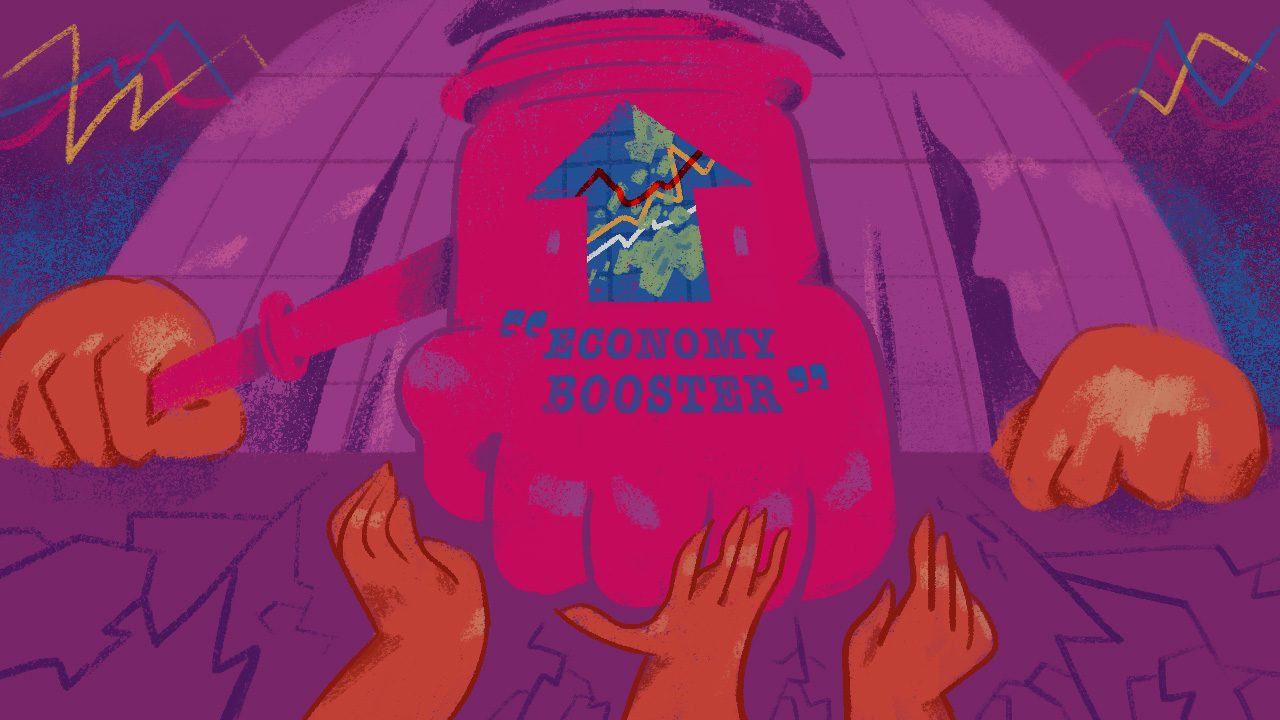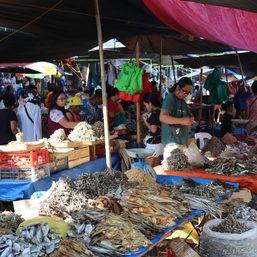SUMMARY
This is AI generated summarization, which may have errors. For context, always refer to the full article.

Leave it to our government leaders to always get their priorities wrong.
Amid the coronavirus pandemic — and rather out of the blue — House Speaker Lord Allan Velasco chose to revive discussions to amend the 1987 Constitution, specifically its economic provisions.
Velasco, along with other lawmakers allied with President Rodrigo Duterte, say they’re pushing for “surgical” amendments only. This largely means appending 5 simple words (“unless otherwise provided by law”) to key foreign ownership provisions.
Such amendments, they say, will lure in foreigners whose investments could shore up our economy now ravaged by the pandemic, and also boost growth in the long run.
But critics have questioned the timing of the proposed charter change (Cha-Cha), what with the May 2022 presidential elections just around the corner.
In this piece, I argue that lawmakers and other proponents are overselling economic Cha-Cha. It’s not what we need right now.
No cure-all
On January 13, the House constitutional amendments committee invited 6 economists and pundits to talk about the pros and cons of economic Cha-Cha.
Four of the resource persons are outspoken proponents of the measure, and they decried the restrictive provisions that have plagued the Constitution since 1935, hampered the inflow of foreign direct investments (FDIs), and pulled back our economic progress vis-à-vis our neighbors.
(When we say FDIs, think of multinational corporations spending tons of money to set up new factories to manufacture, say, cars or semiconductors, or acquire existing companies to augment their global production lines.)
Loosening these constitutional restrictions, these resource persons say, could generate economic activity, create jobs, boost incomes, and even abate hunger. Listening to them, economic Cha-Cha almost sounds like a cure-all.
But it’s easy to overstate the benefits of economic Cha-Cha.
During the House hearing, National Scientist Raul V. Fabella rightly said that constitutional change alone “will not create a tsunami of inward foreign investment.” Many other factors matter, such as the cost of electricity, the number of steps to set up a business, the effectiveness of the judicial and legal systems, and the local peace and order situation.
Indeed, looking at the literature, there’s no solid empirical finding that legal restrictions significantly hamper the inflow of FDIs.
A 2016 paper, which eventually made its way to an Asian Development Bank (ADB) report, found that, controlling for other factors, the quality of local governance was the single most important determinant of FDI inflows from OECD to developing countries. (Local governance here might refer to, say, the rule of law, control of corruption, and political stability.)
Quite damningly, FDI restrictiveness per se didn’t turn out to be a significant factor.
This suggests that even if Congress manages to amend the Constitution and relax its foreign ownership restrictions, there’s no assurance at all that investors will rush into the country — absent sufficient reforms toward good governance.
Counterproductive policies
Meanwhile, the same ADB paper found that where the quality of governance is low, policies that make it easier to do business — like easier tax payments, contract enforcement, construction permits, or access to credit — could still spur FDI inflows.
Unfortunately, Duterte’s own policies have made it harder rather than easier to do business in the country.
For starters, Duterte’s foul attacks on big businesses have needlessly muddled the investor climate pre-COVID. Perhaps more than anything else, investors want predictability and consistency in rules and regulations — not maddening uncertainty and presidential caprice. (READ: Look back: Duterte’s tussles with big business)
Duterte’s prospective policies are also causing investor jitters.
At Duterte’s behest, Congress is finalizing the Create bill, which entails tax cuts for corporations. But National Scientist Fabella also pointed out that investors or “locators” of the Philippine Economic Zone Authority will see higher rather than lower effective tax rates under Create: from a 5% gross income tax to a 25% corporate income tax rate.
Far from being a come-on for investors, Duterte’s Create could prove a major turnoff. Indeed, some investors have threatened to pull out of the country once Create is signed into law.
Finally, we must note that Duterte did sign the Ease of Doing Business Act in 2018. But that law hasn’t yet ushered in too many FDIs as one might expect. In fact, new FDIs dropped steeply and then stagnated in recent years (Figure 1).
Figure 1.
The Philippines did jump 26 ranks in the World Bank’s latest Ease of Doing Business Report, released in 2019. But the Philippines ranked only 7th out of the 10 ASEAN countries, and we fared particularly low in “starting a business” and “getting credit” (Figure 2). Vietnam — which will soon overtake us in terms of average incomes — ranked 5th in ASEAN and 70th worldwide.
Our 26-rank jump must also be taken with a grain of salt: the World Bank has since suspended its Doing Business Report due to “a number of irregularities” found in their data and methodology.
Figure 2.
Stimulus programs, not Cha-Cha
Economic Cha-Cha is also being disingenuously sold today as a way to rescue our economy from the recession.
But even if lawmakers successfully introduce their “surgical” amendments, it will take years for them to create laws that specify new foreign ownership rules across various sectors of our economy. Once those laws are passed, it will take even more time for investors to flock to the country.
Our economy needs rescuing now. Rather than waste time over constitutional amendments, lawmakers will do well to focus instead on bold fiscal policies: basically, aggressive government spending.
All over the world economists are now pushing for titanic spending plans to save their respective economies — even at the cost of swelling budget deficits or revenue shortfalls.
US President Joe Biden recently unveiled a jaw-dropping $1.9 trillion stimulus program, more than twice as large as Obama’s stimulus program during the Great Recession. Among other things, Biden’s plan comprises a $1,400 check to every American below a certain income level, additional unemployment insurance, money for schools to safely reopen, a national vaccination program, and — perhaps most controversially — a doubling of their minimum wage to $15 per hour.
By comparison, Duterte spending plan this year seems feeble if not pathetic. Unsettlingly, lawmakers even slashed the health budget and failed to properly allocate enough money for vaccine procurement and distribution. (READ: In 2021 budget, Duterte funds dubious infra projects, no vaccines)
Some lawmakers are already mulling additional allocations. Marikina Rep. Stella Quimbo, an economist, is proposing Bayanihan 3, amounting to P400 billion, chiefly to extend a helping hand to small businesses — many of which continue to suffer and die amid the recession.
Measures like this will help save our economy — not economic Cha-Cha. Besides, why should government focus on attracting foreign investors when so many Filipino business owners are in desperate need of help — here and now?
The more lawmakers oversell the merits of economic Cha-Cha, the more it looks like a scam. We haven’t even talked about the political constitutional amendments that could very well be the ulterior motive behind all this. – Rappler.com
JC Punongbayan is a PhD candidate and teaching fellow at the UP School of Economics. His views are independent of the views of his affiliations. Follow JC on Twitter (@jcpunongbayan) and Usapang Econ (usapangecon.com).
Add a comment
How does this make you feel?
![[ANALYSIS] A new advocacy in race to financial literacy](https://www.rappler.com/tachyon/2024/04/advocacy-race-financial-literacy-April-19-2024.jpg?resize=257%2C257&crop_strategy=attention)


![[In This Economy] Can the PH become an upper-middle income country within this lifetime?](https://www.rappler.com/tachyon/2024/04/tl-ph-upper-income-country-04052024.jpg?resize=257%2C257&crop=295px%2C0px%2C720px%2C720px)

There are no comments yet. Add your comment to start the conversation.